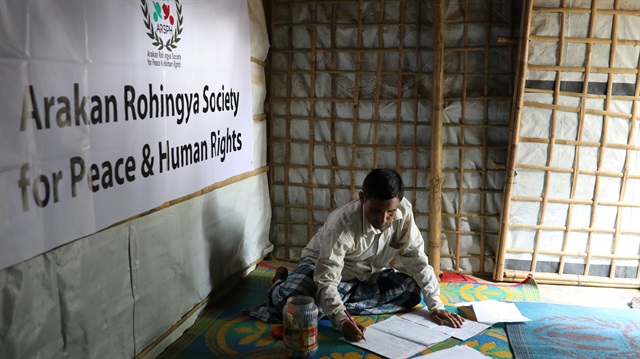

File photo
Myanmar asked to replace term 'Forcibly displaced Myanmar nationals' to 'Displaced persons from Rakhine State' on IDs
Myanmar has sought for Bangladesh to replace the term “Forcibly displaced Myanmar nationals” to “Displaced persons from Rakhine State” on registration cards issued to Rohingya refugees in Cox's Bazar.
Myanmar made the demand during a meeting last week, Bangladeshi officials have said.
A 15-member Bangladeshi delegation led by Foreign Minister AH Mahmood Ali visited Myanmar between Thursday and Saturday.
It was the first state-sponsored visit to Myanmar since the Rohingya fled to Bangladesh a year ago.
Human Rights Watch (HRW), however, said in a statement on Wednesday that Bangladesh had “agreed” to the change.
“While changing a few words on a refugee's ID card may seem inconsequential, for the 700,000 Rohingya refugees in Bangladesh who fled ethnic cleansing in Myanmar a year ago, it is essential,” said Bill Frelick, director of Refugee Rights Program of HRW.
"This change signals that Myanmar doesn't intend to honour the citizenship rights of Rohingyas, nor acknowledge the cause of their displacement – security force operations that included murder, widespread rape, mass arson, and pillage," HRW added at the statement.
The commissioner of the Bangladesh Refugee Relief Repatriation Commission (RRRC) Mohammad Abul Kalam told Anadolu Agency on Thursday that Myanmar raised the ID card issue.
“The Foreign Ministry is the authority to take final decision to bring the change. We have yet to get any formal decision or instruction on the matter,” he said.
Rohingya refugees have long expressed doubts on whether they would benefit from rights as citizens if repatriation were to occur.
Executive director of Transparency International Bangladesh, Iftekhar Zaman, on Thursday told Anadolu Agency that identifying Rohingya refugees as Myanmar nationals was necessary for them to acquire their rights as citizens.
“The international community has failed to pay due importance to the humanitarian crisis created by Myanmar on Rohingya people which [puts] Bangladesh in a trap.”
Since Aug. 25, 2017, more than 750,000 refugees, mostly children and women, have fled Myanmar and crossed into Bangladesh after Myanmar forces launched a crackdown on the minority Muslim community, according to Amnesty International.
At least 9,400 Rohingya were killed in Rakhine from Aug. 25 to Sept. 24 last year, according to Doctors Without Borders.
The Rohingya, described by the UN as the world's most persecuted people, have faced heightened fears of attack since dozens were killed in communal violence in 2012.
The UN has documented mass gang rapes, killings -- including of infants and young children -- brutal beatings, and disappearances committed by security personnel. In a report, UN investigators said such violations may have constituted crimes against humanity.
#Bangladesh
#Rohingya
#myanmar



